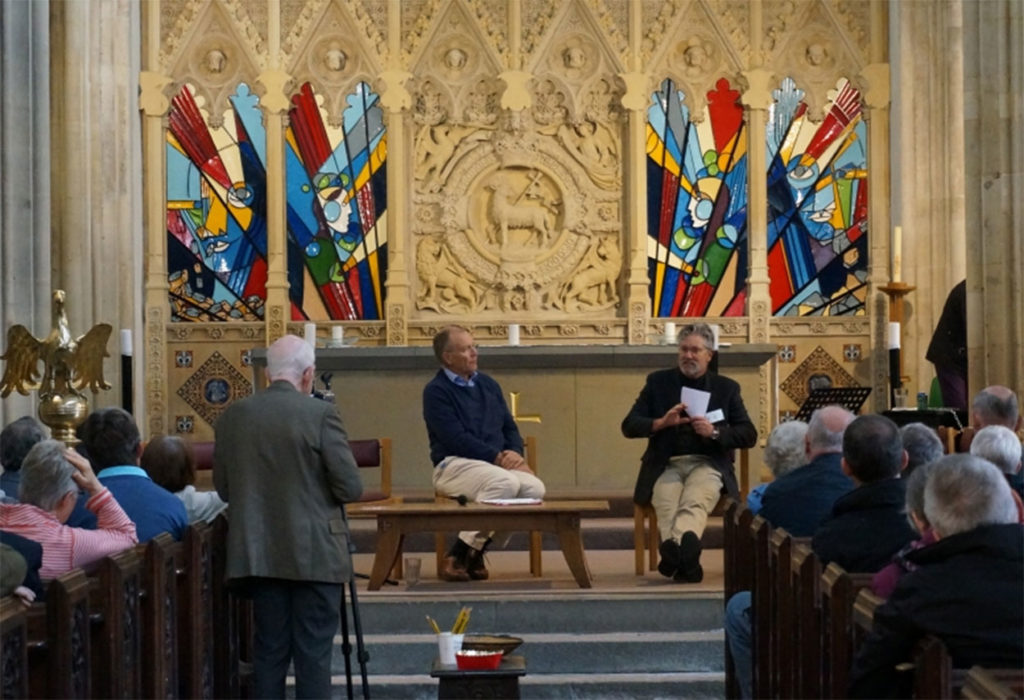A collection of Marcus’ writings will be published in a new book available in March 2017 entitled Days of Awe and Wonder: How to be a Christian in the 21st Century. Three colleagues of Marcus’ were asked to reflect on this latest book and comment on his contribution to the conversation about being Christian in today’s world: Robin Meyers, Walt Brueggemann, Tom Wright. Lin Knight, past director of Ring Lake Ranch where Marcus held many a summer seminar, and Buzzy Picren, director of January Adventure, St. Simons, Georgia, where Marcus often spoke, also share their reflections. This month we will share Robin Meyers’ thoughts. Robin Meyers recently contributed to our ongoing conversation yet, we wanted to feature him again because Robin is our guest lecturer at an event to celebrate the release of the new book at Trinity Episcopal Cathedral, Portland, Oregon where Marcus served as Canon Theologian. Robin bears a mantle. May it be a blessing upon Robin. And for us who continue in the way of the Spirit.
The following are Robin Meyers’ answers to questions about the Borg book release:
As you know, HarperOne will soon be introducing a new Marcus Borg book – can you share with us your thoughts on this new book?
- This new book, Days of Awe and Wonder: How to Be a Christian in the 21st Century, is a collection of “essential” Borg ideas, and challenges to orthodox Christianity, from one of the most influential proponents of progressive Christianity in the land. Marianne Borg called this collection of her late husband’s work, “the fruit and labor of doubts and loves.” From some of his earliest writing on his doctoral dissertation at age 27, to his final work, Convictions, at age 70, the book brings together Borg’s “doubts and loves” on the life of the Spirit, faith as trust, his conversion to Mysticism, the human, historical Jesus, new ways to conceive of God, and the wisdom of other faith traditions. As always, Marcus Borg argues for faith as a way of being in the world, The Way of compassion, and not a set of creeds and doctrines promising rewards in exchange for “beliefs.” Borg readers will not find so much here that is new, as they will enjoy an accessible compilation of the sweep and depth of his life’s work.
How did you first learn about the work of Marcus Borg?
- I first learned of the work of Marcus Borg when one of my parishioners (I am the pastor of a progressive church in Oklahoma City), handed me a copy of Meeting Jesus Again for the First Time in the receiving line after church. Instead of “Nice sermon Reverend”, she said, “I think you will love this book!”
Can you comment on how you see your work and Marcus’ serving the meaning of Jesus for us today? In particular, what you shared in common? How will you remember Marcus?
- The idea that I would carry on the work of Marcus Borg is flattering, but also a bit intimidating. There is only one Marcus Borg, and I am not Marcus Borg. Even so, Professor Borg himself spoke directly to me about his expectations, and mentioned it to others (including Marianne). So I am trying the best I can to be worthy of that trust. Only recently, I co-presented with John Dominic Crossan at an even called January Adventure on St. Simons Island Georgia, and so the “successor to Borg” perception deepened. I am delighted that Marianne asked me to keynote the book-release event at Trinity Episcopal Cathedral in Portland on March 10 and 11. I will do the best I can to carry on his work, and to demonstrate its profound effect of my life and ministry.
What would you say most attracts you to Marcus’ writing?
- What most attracts me to the writing of Marcus Borg’s is its clarity. It has the quality of an extended and accessible argument. Perhaps I have read too many incoherent freshman compositions myself not to find such order and precision refreshing. Borg writes as if to flesh out an outline in his mind, just as he often hands out a written outline to his audiences. I also enjoy the autobiographical nature of his work, and believe that his readers can so easily relate to Borg’s own spiritual evolution.
Which of Marcus’ books has meant the most to you?
- The single most important of Borg’s books to me was, Meeting Jesus Again for the First Time. In particular, the idea that religion in the time of Jesus was centered on purity, while Jesus shifted the emphasis to compassion.
More broadly speaking, what influence would you say Marcus has had on Christianity and the world at large?
- Borg’s larger impact on Christianity has been to provide intelligent, honest, authentic, and deeply spiritual reasons for not being orthodox. In particular, the continuing illusion that faith is a matter of belief, rather than a way of being in the world, is crippling the church, even as Professor Borg tries to point us to a new direction. Perhaps no other author has so persuasively argued that the way of the Spirit is the way forward, not the way of Doctrine.
I realize this is difficult, but if you were to sum up Marcus’ work in a few words, what would you say?
- Some words that come to mind about the work of Marcus Borg: biblical responsible, intellectually honest, emotionally satisfying, and social significant. His work is brave, thorough, liberating, reassuring, and as I have said many times to Marianne: His class is not dismissed.



